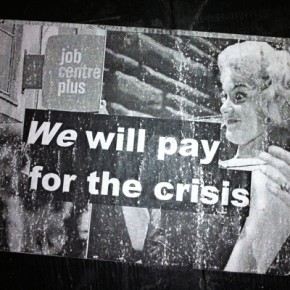It was 1928 when Herbert Hoover coined the phrase “the American system of rugged individualism.” Socialism was growing in popularity, and attempts to paint the ideas behind the movement as dangerous were well underway. In the same speech, the President mentioned the perils of “state socialism,” something that would take away Americans’ freedom if it was ever attempted in the United States.
The things that seem naturally bound up in the American individualist ethos – property rights, freedom of choice, and the free market – have always been guided by the government, immediately creating a contradiction. The frontier spirit and the ideology of property rights obscures the role of the state for their existence. For example, perhaps the largest welfare program in world history was the Homestead Act of 1862, which opened the frontier to settlement by whites. It was a massive federal government land giveaway; freebies for European colonists, at the government’s expense. Never mind that the goodies being given away – parcels of land – were already inhabited by indigenous peoples.
This giveaway is ironically a core piece in the development of the mythology of American individualism. Later on, the free speech tradition in American culture would be cited as yet another aspect of our individualism. Even if some of the key outgrowths of freedom of expression, like rock and roll, and ultimately punk, have been used as vehicles to criticize capitalism. In the US, anti-market sentiment is frequently synonymous with free speech advocacy, especially in its more radical moments.
Is capitalism the natural corollary to individualism? No. Laissez-faire economics, as it is practiced in the US, prescribes the exact opposite. Whereas its proponents contend that it promotes freedom of choice and diversity, the free market in fact promotes social and cultural conformism. In this sense, Hoover’s ‘rugged individualism’ is a typically ideological fairytale. It promotes one thing, only to usher in another.
A real philosophy of individualism would include safeguards for the development of a person’s unique and latent potentialities, and would allow for the cultivation of human potential, unhindered by economic and political power. Actually existing capitalism provides a mechanism for constantly deferring the development of individual potential (and thus individuality) to the future, rationalizing people as chattel, whose only worth lies in their utility to market forces.
A society that genuinely cared about fostering and protecting individuality would allow for its citizens to develop their talents, aptitudes, and inclinations in the freest ways possible, with supports ensuring that everyone had the proper housing, medical care, freedom of speech, and rights to education and economic security upon which the development of higher abilities can be predicated. Societies that live hand to mouth, in a state of constant instability and with no guarantees, are less likely to produce the sorts of highly skilled individuals who are able to explore the development of their own interests and talents.
Unfettered capitalism does not guarantee anything except struggle. In fact, its advocates often harbor a mean-spirited notion of life being rough, hard, and pitiless, as though such difficulties were natural preconditions for human flourishing. Indeed, they tend to harbor a perverse hope that life is harder than it need be, sometimes with the specious and self-serving pretense that poverty and suffering build character, or make one a more morally developed individual.
A real individualism – what could only be called socialist individualism – in contrast to false, or capitalist, individualism – would ensure that humans were able to pursue their own innate talents and aptitudes, and see them through to their logical fruition. As evolutionary biologist Stephen Jay Gould said, “I am somehow less interested in the weight and convolutions of Einstein’s brain than in the near certainty that people of equal talent have lived and died in cotton fields and sweatshops.”
A society that insists a majority of persons must squander their life’s productive energies making a profit for others, or pursuing uninteresting and unrewarding work simply to be able to survive, will waste the productive and creative (in the broadest sense) potentials of that society’s people. A society that allowed for individuals to become just that — fully self-actualized individuals — would not brook any compromise with seeing vital and productive energies utilized towards enriching the coffers, or perpetuating the class privileges of a powerful minority. This is what occurs now, though there is no natural law that says that it has to be like this.
The only way to move towards a society that is truly individualistic, and shows concern for personal freedom, is to work to create a system whereby as many people as possible are given the right and opportunity to have as many options for education, self-enrichment, and personal development as possible. A society that insists there should be no education supports, unemployment insurance, housing rights, or rights to medical care, cannot ensure this.
Photograph courtesy of David Gallagher. Published under a Creative Commons license.






Great article! As we drove to Fort Funston, a beautiful park to walk our dog this morning, we were behind a man who has a truck with a bumper sticker that says “Born Free… Taxed to Death.” Here he was driving on a road, paid for by tax dollars, to a national park, maintained by tax dollars, to enjoy the spectacular view of the Pacific Ocean, which had been defended years ago at this very park by the military against invasion, of course paid for by tax dollars. He walks with a cane, paid for by Medicare (tax dollars), and listens to Hot Talk radio (another bumper sticker), on airwaves that are reserved for that station by a Federal agency (which costs tax dollars) so that they could freely broadcast without pirates stealing their frequency.
And of course the whole “taxed to death” part is kind of silly since the man was obviously still alive to walk his dog!
Those who claim a belief in individual liberty being the key to success would claim that if government got totally out of the way, few if any people would be living “hand to mouth.” But they also believe in “social Darwinism” and that those who did have to live “hand to mouth” because they were either unfit for this world physically or too lazy, would soon die off and all of society would be better for it. Yet when the hurricanes and floods and earthquakes hit, they would look for FEMA just as urgently as anyone else. When their houses catch fire or chest pains hit, they call 911.
Silly. Sad.